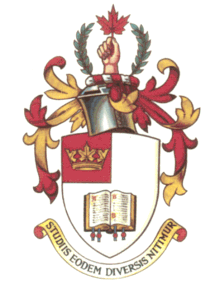Royal Society of Canada
The Royal Society of Canada , also French Société Royale du Canada , SRC for short , recently The Academies of Arts, Humanities, and Sciences of Canada , is the national academy of science in Canada .
history
Based on the model of the London Royal Society founded in 1660 , the Canadian Academy of Sciences was founded in 1882 by the then Governor General Marquess of Lorne . Among its first members were Sir Sandford Fleming , the inventor of the world time zones , and the famous physician Sir William Osler . The Royal Society of Canada was officially established and confirmed by a special "Act of Parliament" and a royal charter in 1883.
organization
The entitled Fellows Academy members designated annually elect a group deserving Canadian scholar to rerecord. From now on they bear the initials FRSC (Fellow of the Royal Society of Canada) after the surname. The admission is considered to be the highest honor Canada bestows on scholars. The respective president of the academy also acts in an advisory capacity on the award of the civil order of Canada by the governor general .
The fellows meet in annual symposia to discuss scientific topics of national importance, such as climate change or environmental issues . The Academy awards a number of medals for excellence in various fields of science. For example, the Willet G. Miller Medal for Earth Sciences, the John L. Synge Award, and the Henry Marshall Tory Medal .
literature
- Calendar Annuaire. The Royal Society of Canada. Ottawa: The Royal Society of Canada, appears annually (with addresses of living fellows). ISSN 0317-3631 .
Web links
- Royal Society of Canada (English / French)
- Find the Fellows
